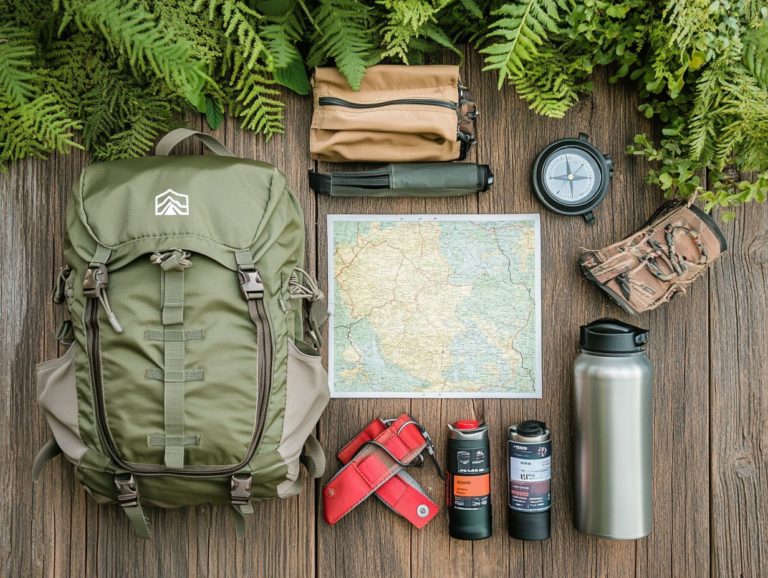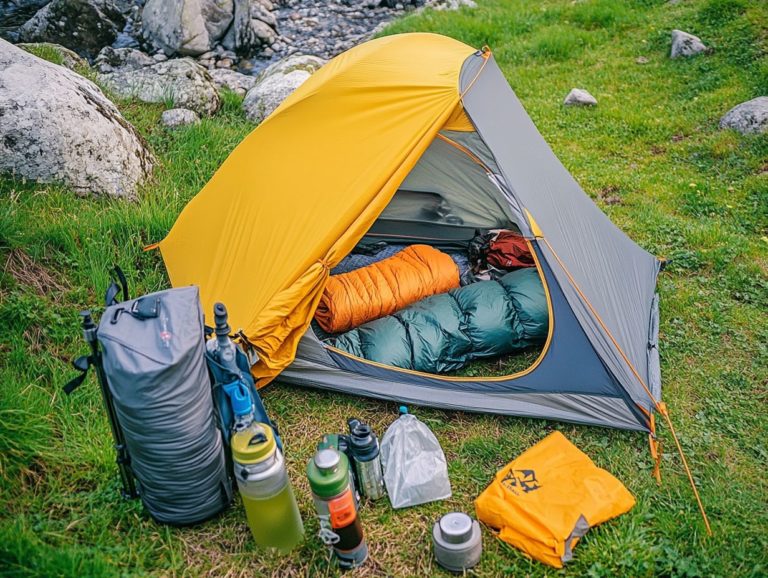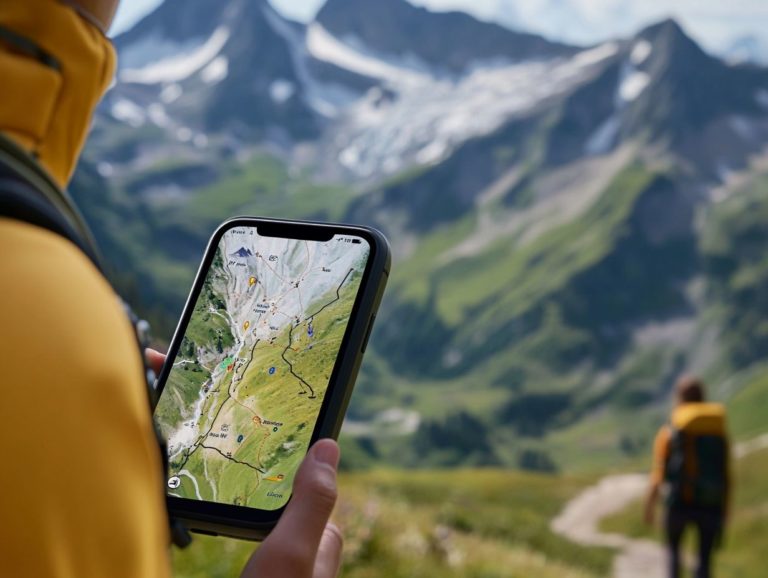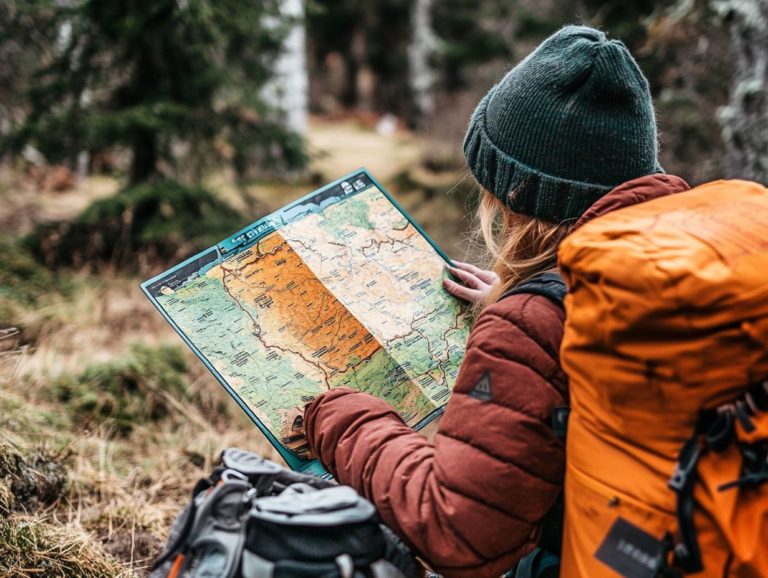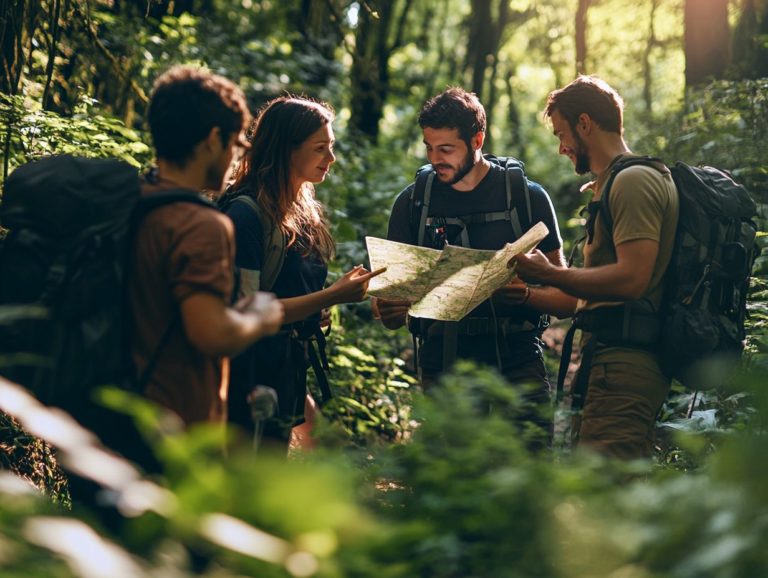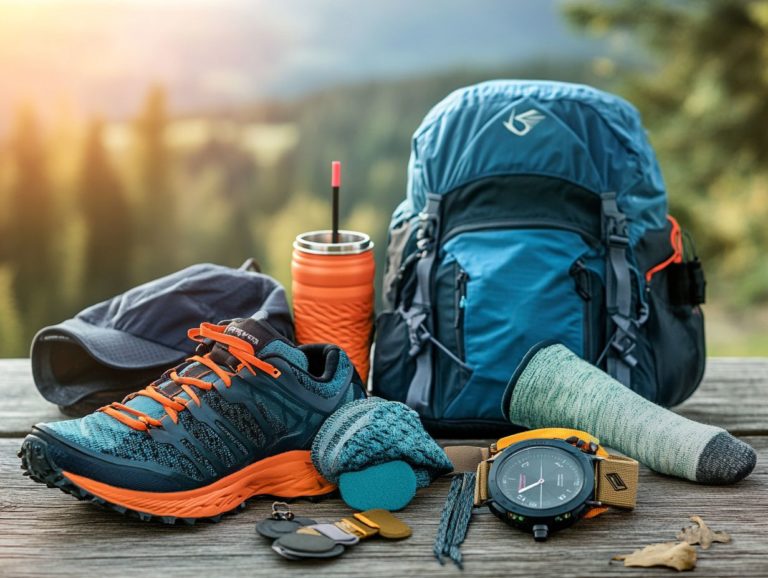How to Choose the Right Hiking Partner
Choosing the right hiking partner can truly elevate your outdoor adventures, transforming them from ordinary outings into unforgettable experiences. A compatible companion not only enhances your journey but also ensures safety and enjoyment along the trails, especially during long-distance hikes.
This guide delves into the benefits of hiking with someone who shares your interests and aspirations. When selecting a partner, consider essential factors like physical abilities and communication styles.
You will also find valuable tips on where to find potential hiking buddies.
The guide provides insights on how to nurture a successful hiking partnership. Whether you’re a seasoned trekker or just starting your outdoor journey, this guide will help you find your perfect adventure buddy right now!
Contents
- Key Takeaways:
- Why Choosing the Right Hiking Partner is Important
- Factors to Consider when Choosing a Hiking Partner
- Similar Interests and Goals
- Communication and Conflict Resolution
- Where to Find Potential Hiking Partners
- Friends and Family
- Questions to Ask Potential Hiking Partners
- Tips for Making the Most of Your Hiking Partnership
- Frequently Asked Questions
- What qualities should I look for in a hiking partner?
- Should I choose a hiking partner based on their hiking experience?
- How important is communication when choosing a hiking partner?
- Can I hike with someone who has a different fitness level?
- What if I can’t find a suitable hiking partner?
- Do I have to stick with the same hiking partner for every hike?
Key Takeaways:
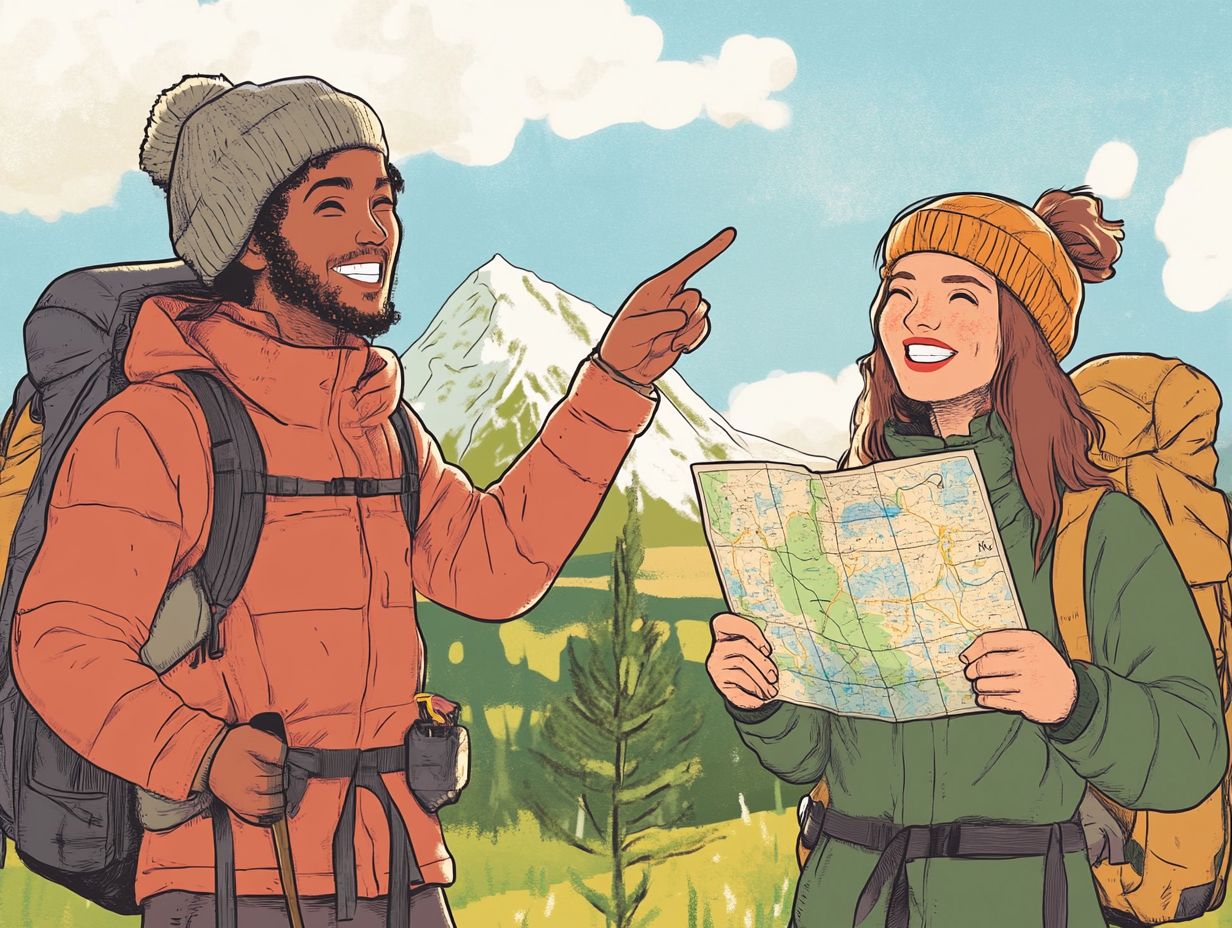
- Choose a hiking partner who shares similar physical abilities and goals to ensure a safe and enjoyable experience.
- Effective communication and conflict resolution skills are essential for a successful hiking partnership.
- Consider joining online communities and hiking groups or asking friends and family to find potential hiking partners.
Why Choosing the Right Hiking Partner is Important
Selecting the ideal hiking partner is essential for a truly enjoyable outdoor experience, particularly on long-distance treks such as the Appalachian Trail. A compatible companion not only elevates your hiking adventures but also opens the door to personal connections and shared moments, creating a feeling of belonging within the hiking community.
Effective communication plays a pivotal role in addressing health concerns and personal boundaries. This ensures both you and your partner align on your goals and expectations for the journey ahead.
Benefits of Hiking with a Compatible Partner
Hiking with a compatible partner brings a wealth of benefits, including enhanced safety, motivation, and the joy of shared experiences in nature.
When you hit the trails with a buddy, the adventure becomes even more thrilling! You capitalize on the safety that comes in numbers, minimizing the risks of navigating unfamiliar terrains. You also cultivate a supportive atmosphere that breeds camaraderie and motivation. This shared passion for nature often sparks inspiring conversations and hearty laughter, especially during those challenging hikes when fatigue starts to set in. In those moments, a few encouraging words can truly make all the difference.
After a fulfilling day on the trails, relaxing around a campfire, engaging in games, or swapping stories strengthens the bond between hiking partners. This transforms simple outings into unforgettable memories.
Factors to Consider when Choosing a Hiking Partner
When choosing a hiking partner, consider their physical abilities and hiking experience, as these can significantly impact your adventure.
Equally important is the ability to communicate effectively. Aligning on shared goals and expectations will enhance the experience and ensure a more enjoyable journey together.
Physical Abilities and Experience Level
Prioritize physical abilities and experience level when selecting a hiking partner. Mismatched fitness can lead to frustration and safety concerns in the great outdoors.
The harmony between your fitness levels and shared hiking experiences not only elevates the enjoyment of the journey but also enhances overall safety.
Engaging in practice hikes to build your stamina and skills is essential. This allows you to assess your endurance and skills effectively. Joining organized hiking events can also provide valuable insights into your capabilities.
As you evaluate a potential partner’s fitness level, consider their hiking history, pace, and ability to tackle challenging terrains. For guidance, you might find helpful tips on how to choose the right hiking trail. Remember, open communication about expectations and readiness is crucial for ensuring a rewarding hiking experience for both of you.
Similar Interests and Goals
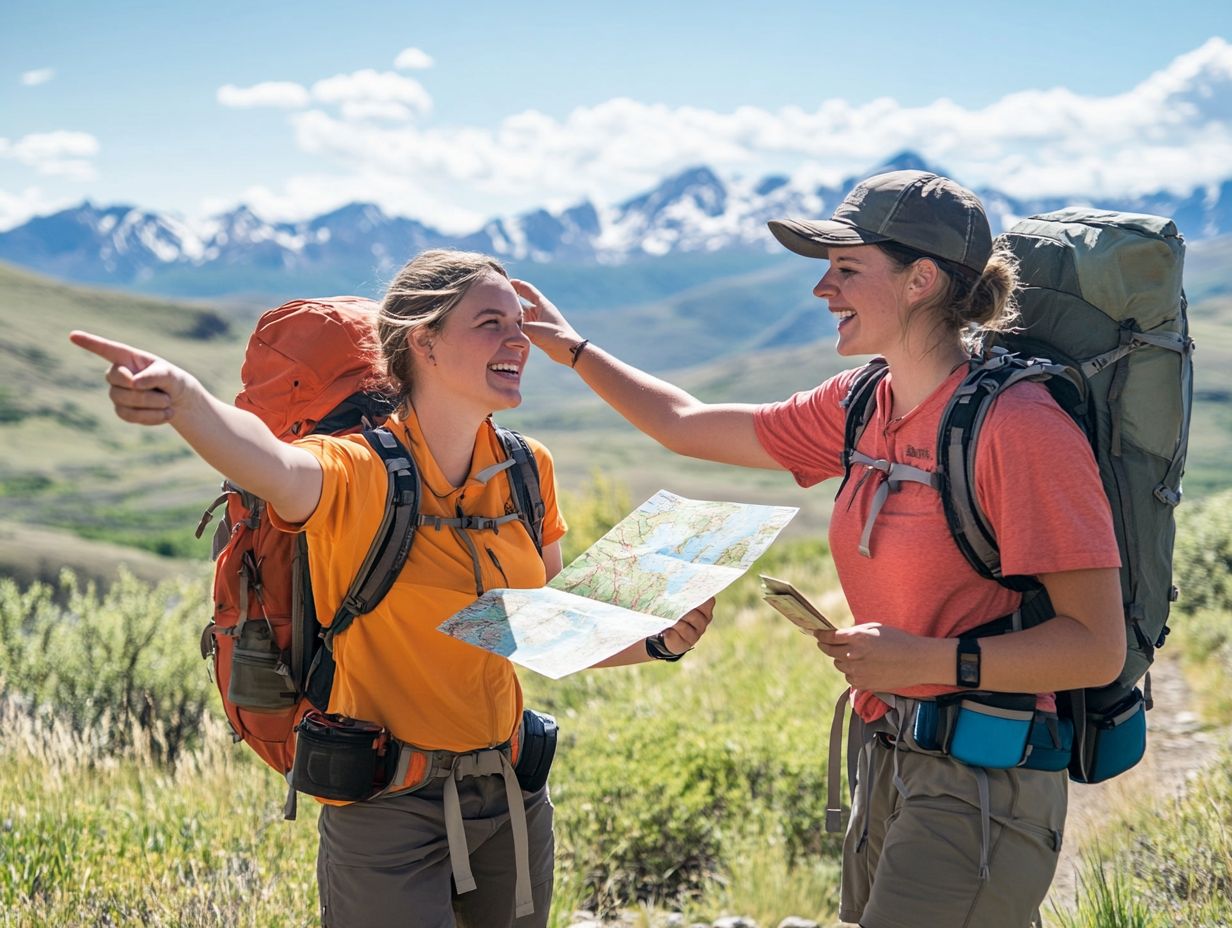
Having similar interests and goals in hiking significantly enhances your experience. When you align your preferences whether you enjoy leisurely nature walks or crave challenging mountain treks the connection deepens, leading to a more enriched journey.
This harmony creates a supportive atmosphere where you and your fellow hikers feel understood and encouraged. Your shared love for nature fosters friendship and helps cultivate a vibrant hiking culture. As you navigate diverse terrains, from serene riversides to rugged peaks, the laughter, stories, and moments of awe create lasting memories.
In the end, these shared experiences elevate mere excursions into cherished adventures, enriching your spirit and soul.
Communication and Conflict Resolution
Effective communication is crucial for a successful hiking partnership. It helps you navigate conflicts and enriches personal experiences, strengthening connections with your fellow hikers.
Focus on active listening by really paying attention when someone talks. This ensures that everyone feels heard and understood. By engaging in conversations, you can express your expectations about pace, routes, and breaks, fostering clarity within the group.
Sharing personal stories from past hikes cultivates friendship and makes the experience more enjoyable for everyone. When challenges arise on the trail, addressing them proactively creates an environment where conflict resolution is a shared responsibility.
Where to Find Potential Hiking Partners
You can discover potential hiking partners through various avenues, such as joining hiking groups, engaging with online communities, and leveraging social media connections that cater to outdoor enthusiasts.
Online Communities and Hiking Groups
Online communities and hiking groups are exceptional for discovering fellow adventurers who resonate with your outdoor aspirations.
Engaging with these platforms enhances your hiking excursions and cultivates a sense of belonging among fellow nature lovers. By participating in discussions on social networks, you can share tips, gear recommendations, and insights about local trails, turning solitary hikes into memorable journeys.
Joining hiking groups offers emotional support and motivation. Members uplift one another, encouraging the pursuit of challenging terrains. Attending organized hiking events allows you to forge lasting friendships while immersing yourself in the beauty of nature.
Friends and Family
Your friends and family often make the best hiking partners, providing a familiarity that enhances your outdoor adventures.
As you explore nature together, these companions help create lasting memories, strengthening your bonds. With each ascent, laughter and camaraderie resonate through the trees, turning the journey into a delightful experience.
This time together invites deeper conversations and support that fortifies friendships. Whether you re tackling challenging terrains or pausing to admire breathtaking views, having familiar faces by your side transforms a trek into a joyous celebration of nature and connection.
Questions to Ask Potential Hiking Partners
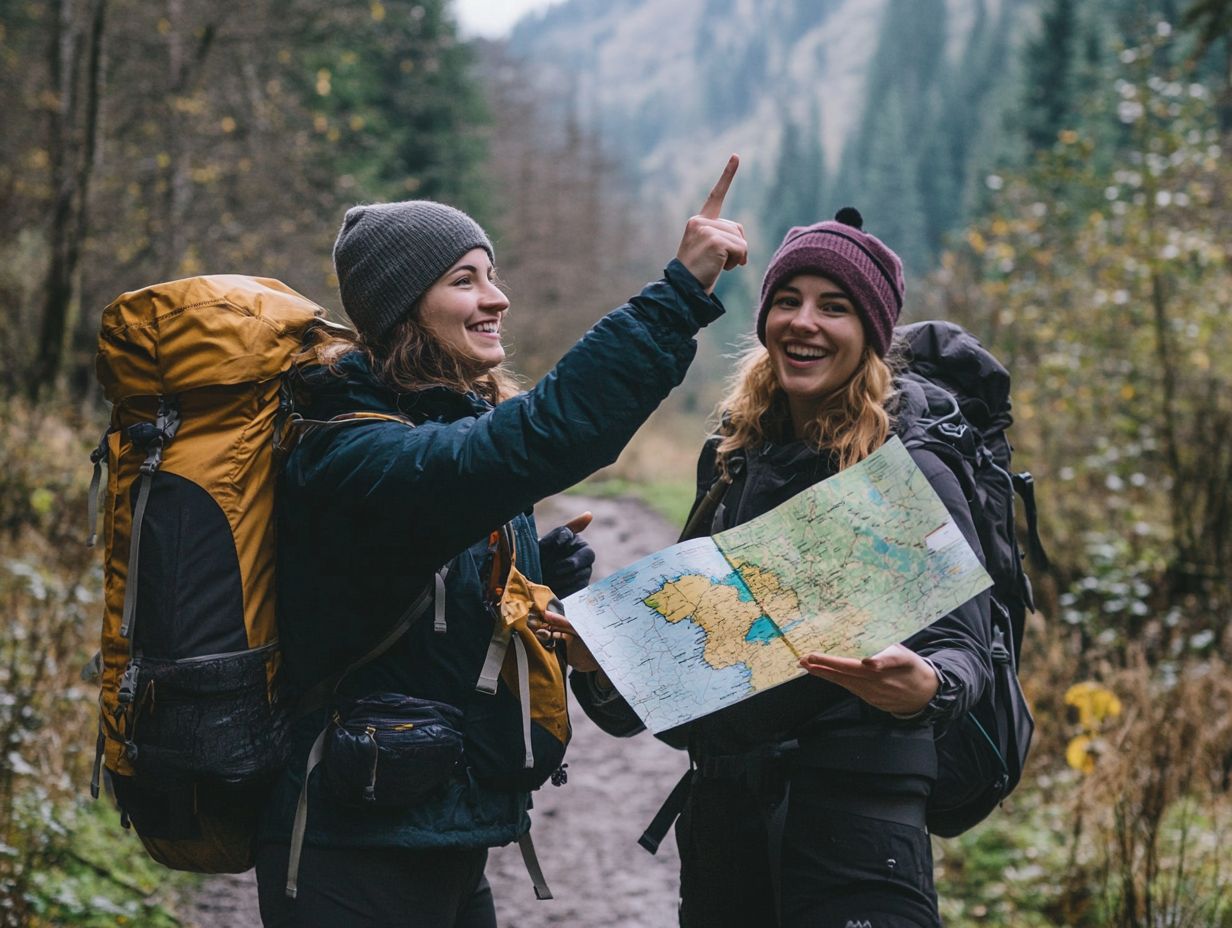
When evaluating a potential hiking partner, pose specific questions to assess compatibility.
Consider their hiking style, personal details, and communication preferences to ensure a harmonious experience on the trails.
Important Topics to Discuss
Discuss key topics such as your hiking experiences, expectations, and personal goals. This is essential for building a strong foundation for a successful hiking partnership.
This dialogue paves the way for understanding individual preferences and challenges. It creates an atmosphere of trust and camaraderie. By sharing your past adventures, you and your partner can discern which aspects of hiking you both enjoy and what you aim to accomplish together. If you’re considering planning a trip, check out this guide on how to plan a hiking trip with friends.
Align your goals today to elevate your hiking adventures! This alignment deepens your personal connection and fosters open communication. It makes it easier to address any concerns that may arise during your hike, ensuring that both of you feel valued and heard throughout the journey together.
Tips for Making the Most of Your Hiking Partnership
To truly maximize the benefits of your hiking partnership, immerse yourself in effective communication, build teamwork, and manage expectations. This approach ensures that each hiking adventure is enjoyable and rewarding.
Effective Communication and Teamwork
Effective communication and teamwork are vital skills for any hiking partnership. They enable you and your partner to share experiences and deepen your bond through a mutual love for the great outdoors.
This dynamic enriches your overall adventure and lays a solid foundation for tackling challenges along the trail. By openly discussing your goals, concerns, and preferences, you can collaborate more efficiently, ensuring that everyone feels included and supported.
Engaging in activities like campfire games at the end of the day can further build these skills. This creates a lively atmosphere where laughter thrives and camaraderie blossoms. Such interactive moments pave the way for deeper conversations and foster trust. This makes it easier for you to face steep climbs or unpredictable weather conditions together as a united front.
Managing Expectations and Boundaries
It s crucial to manage your expectations and set clear boundaries for a great hiking experience! This ensures that you and your companion feel comfortable and understood throughout your adventures.
Take the time to discuss your individual hiking styles. Whether you prefer a brisk pace while your partner enjoys a leisurely stroll, openly share any personal limits, such as health concerns or physical challenges. Effective communication can seamlessly integrate these personal details into your hiking culture, building an environment of mutual respect and understanding. For tips on finding the right partner, check out this guide on how to select a hiking buddy.
Creating an inclusive atmosphere where each person feels free to express their preferences helps prevent misunderstandings. By setting clear expectations before hitting the trails like establishing rest breaks or selecting suitable routes you can ensure a more harmonious experience for everyone involved.
Check out this helpful video on hiking partnerships:
Frequently Asked Questions

What qualities should I look for in a hiking partner?
When choosing a hiking partner, look for someone who shares similar fitness levels, hiking goals, and interests. Consider their experience level, communication skills, and compatibility with you as a person.
Should I choose a hiking partner based on their hiking experience?
Hiking experience can be a valuable factor to consider, especially for more challenging or technical hikes. However, it’s not the only thing that matters. Assess their fitness level and communication skills, as well as compatibility with you.
How important is communication when choosing a hiking partner?
Communication is crucial when hiking with a partner. Choose someone open to discussing plans, making decisions together, and communicating any concerns or issues during the hike. Good communication can make for a safer and more enjoyable experience.
Can I hike with someone who has a different fitness level?
It’s possible to hike with someone who has a different fitness level. However, it s important to have a discussion beforehand. Ensure everyone’s expectations are aligned and have a plan for potential challenges. It’s also a good idea to start with shorter and easier hikes to gauge compatibility.
What if I can’t find a suitable hiking partner?
Struggling to find a hiking partner? Join a local hiking club! It’s a fantastic way to meet people who enjoy hiking and learn from seasoned hikers.
You can also ask friends or family if they want to join you on the trails.
Do I have to stick with the same hiking partner for every hike?
No need to stick to one hiking partner. Feel free to hike with various people!
Just communicate your plans with each new partner and ensure you’re a good match before tackling a challenging hike.

